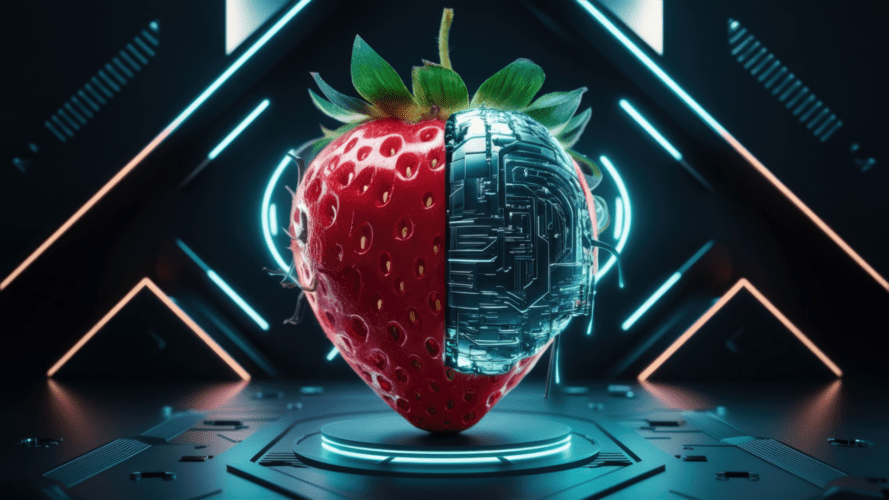Project Strawberry: OpenAI's Groundbreaking Leap Towards Self-Learning AI

For months, the tech world has been abuzz with rumors of a secret OpenAI project, codenamed "Q*" or Project Strawberry. Until recently, it remained speculative—whispers of a self-learning algorithm allegedly in development. This week, however, those whispers grew louder, as new details emerged to confirm the existence of Project Strawberry, transforming the rumor mill into a promising vision of AI's future.
OpenAI is expected to integrate this self-learning reasoning algorithm into ChatGPT soon, with far-reaching implications for AI's role in problem-solving and its evolution toward Artificial General Intelligence (AGI). Here, we'll explore the potential impact of Project Strawberry and what this innovation could mean for the next generation of intelligent systems.
Reports of Project Strawberry first surfaced through an anonymous source on social media. Known only by the username "Jimmy Apples," this insider has consistently leaked accurate information on OpenAI’s upcoming developments, fueling widespread interest in the mysterious project. With Sam Altman, CEO of OpenAI, dropping subtle hints and an increasing flow of information from reliable sources like Reuters and The Information, it’s now clear that Project Strawberry is real—and potentially revolutionary.
While initial speculations assumed that Project Strawberry might be a new version of GPT, it’s now understood to be something different: a specialized reasoning algorithm capable of solving complex mathematical problems and advanced programming tasks independently. And unlike previous large language models (LLMs), which rely on training from existing datasets, Project Strawberry is designed to engage in a process called self-learning, a leap toward AI that can autonomously discover new knowledge.
The key innovation of Project Strawberry lies in its self-learning capability. Unlike traditional LLMs like GPT-4 or Claude, which derive their knowledge from vast internet datasets, Project Strawberry is expected to autonomously explore and derive new insights. This functionality could enable Project Strawberry to build knowledge independently, moving beyond the fixed training datasets that most models rely on.
In essence, Project Strawberry represents a shift from a "learning from data" approach to a "learning by discovery" model, where the AI continuously refines and expands its understanding without external updates. If successful, this could lay the groundwork for a new kind of LLM—one that creates new knowledge rather than merely retrieving it.
While LLMs have achieved impressive language generation capabilities, they often struggle with complex reasoning and problem-solving tasks, especially those that require deep mathematical or logical insights. Project Strawberry's reasoning algorithm aims to address this gap, focusing specifically on the areas of mathematics and programming.
By incorporating advanced reasoning capabilities into ChatGPT, OpenAI could allow users to tackle intricate problems more effectively than ever before. Imagine a ChatGPT that can solve complex math problems, debug code with minimal input, and even propose novel solutions to previously unsolved challenges. This reasoning-oriented approach could make ChatGPT an invaluable tool for technical fields, providing reliable assistance to engineers, mathematicians, and data scientists alike.
Not surprisingly, Project Strawberry has attracted the interest of intelligence agencies, including the FBI and CIA, which have already observed demonstrations of the algorithm. This scrutiny likely stems from the potential risks associated with self-learning AI, which raises important security and ethical questions. A self-learning AI that can autonomously generate new information has a profound impact not only on technology but also on information security, privacy, and control over AI’s evolving knowledge.
OpenAI has historically approached safety concerns with caution, and it’s probable that Project Strawberry will come with strict guidelines to prevent misuse. However, as AI systems gain self-learning capabilities, questions about containment, transparency, and accountability will become increasingly relevant.
According to the latest leaks, OpenAI’s reasoning algorithm will lay the foundation for a new LLM called "Orion." The introduction of Orion suggests that OpenAI may be developing a distinct line of models beyond its GPT series, with unique capabilities and a different approach to learning and reasoning.
While details on Orion are scarce, its development could signal a new direction for OpenAI, one that embraces the potential of self-learning while focusing on highly specialized, high-value tasks. If Orion is indeed based on Project Strawberry's self-learning reasoning algorithm, it may offer capabilities unlike any language model on the market, bringing OpenAI closer to creating an AGI.
For years, AGI—the concept of AI that can perform any intellectual task a human can—has been considered a distant goal. But the advent of self-learning algorithms like Project Strawberry suggests that OpenAI might be inching closer to this milestone. The ability for an AI to generate new knowledge autonomously is a key characteristic of AGI, and Project Strawberry's focus on reasoning and problem-solving lays the groundwork for a more generalized form of intelligence.
If Project Strawberry fulfills its potential, OpenAI's journey toward AGI could accelerate, making it possible to tackle challenges that require creative, adaptive intelligence rather than predefined responses. In effect, the development of Orion and other self-learning models could redefine the boundaries of what AI can achieve, paving the way for machines that not only understand the world but also contribute new insights to it.
As OpenAI prepares to unveil Project Strawberry, the tech community is eagerly awaiting the algorithm's integration with ChatGPT, expected sometime this fall. This addition will likely mark a turning point, positioning ChatGPT not just as a conversational assistant but as an AI capable of assisting in complex, technical problem-solving.
Project Strawberry represents an exciting and transformative step forward, but it also introduces challenges and responsibilities. OpenAI's progress toward self-learning models will need to be matched with rigorous safeguards, ethical guidelines, and transparency measures to ensure that these advancements benefit society as a whole.
For now, Project Strawberry offers a glimpse into the future of AI—a future where machines evolve alongside us, discovering and reasoning autonomously, and reshaping our understanding of artificial intelligence.